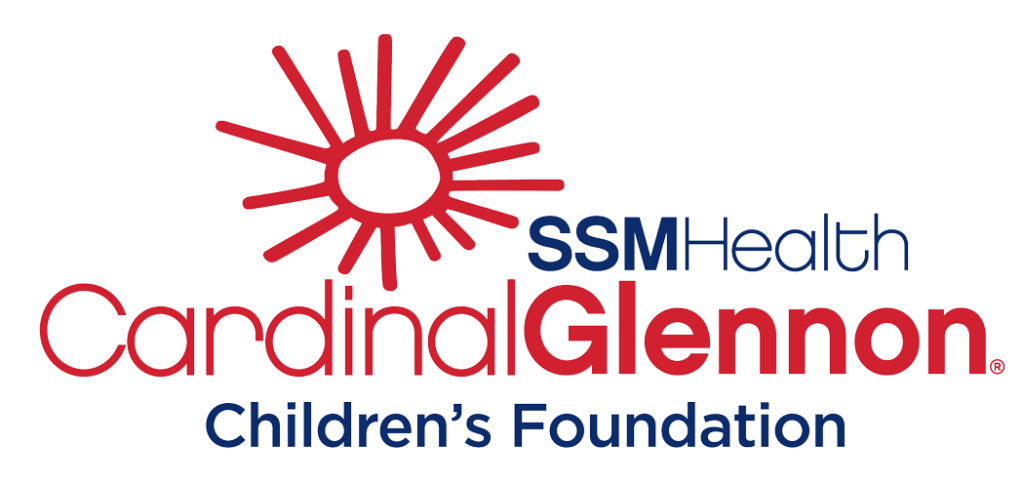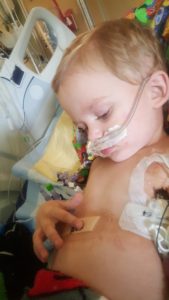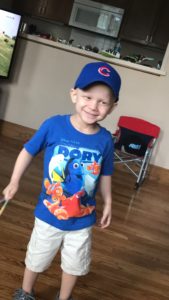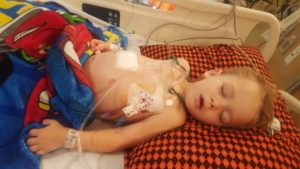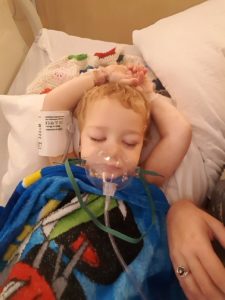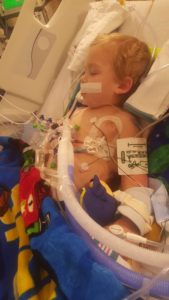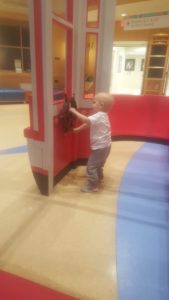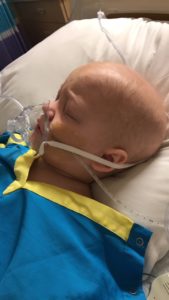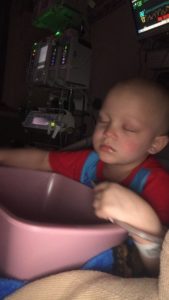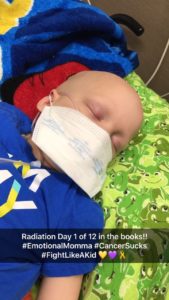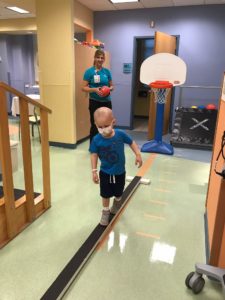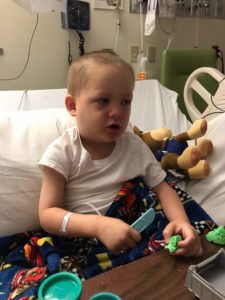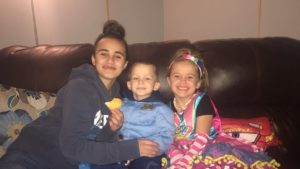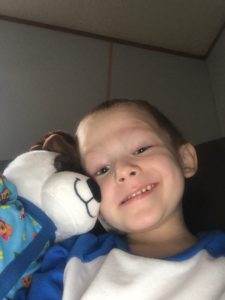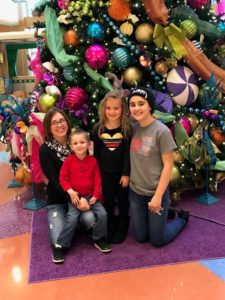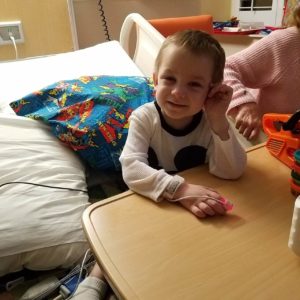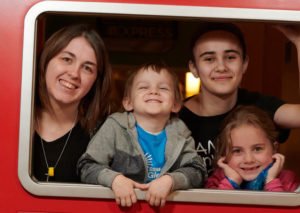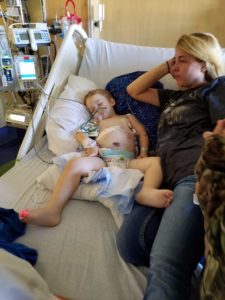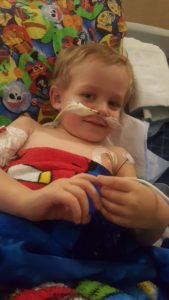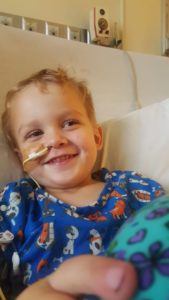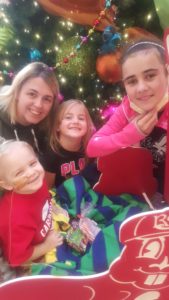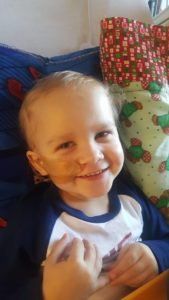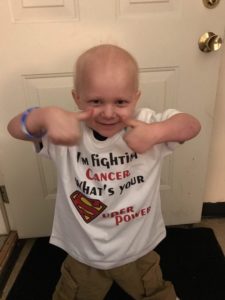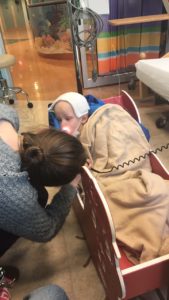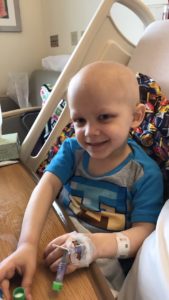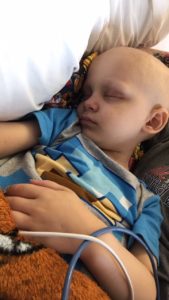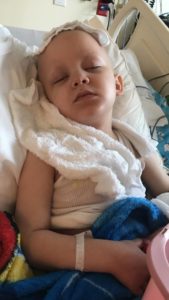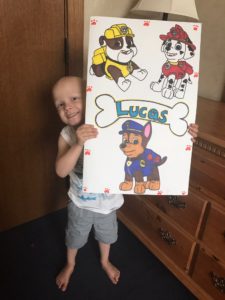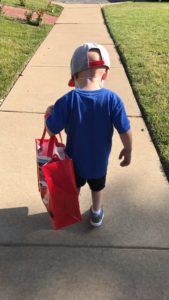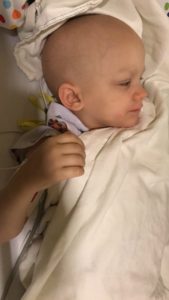Our Patients:
Lucas Simcox-Powell
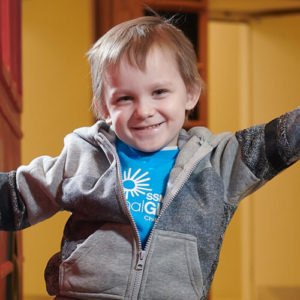
September is National Childhood Cancer Awareness Month. Two years ago this month, in 2016, that month of national observance would not have meant anything to Tana Simcox. But fast forward to current day, and childhood cancer is her daily awareness with 5-year-old son, Lucas.
In September 2016, Lucas began complaining of “belly pain.” Her son who was normally playful and active at preschool had become a child who was frequently observed crying and crouching underneath his desk. Tana made multiple trips back and forth to the pediatrician, hoping to find answers to this pain and posture so atypical of her son. No testing was ever completed; only repeated suggestion that he was “constipated.” Over the course of September-October, Lucas continued to have pain. His belly had grown significantly in size; he stopped eating and drinking; he was no longer able to go to the bathroom and he was unable to sleep at night. Frustrated and exhausted, Tana took Lucas to their local Emergency Department. Upon examination of Lucas, they immediately put him in an ambulance to SSM Health Cardinal Glennon Children’s Hospital. He was admitted, and quickly had an ultrasound and several laboratory studies. Within 24 hours, Tana met Dr. Deepika Bhatla, hematologist/oncologist at SSM Health Cardinal Glennon. Dr. Bhatla gave Tana the news of suspected neuroblastoma.
Neuroblastoma is a type of childhood cancer that develops in nerve tissue outside of the central nervous system. It usually begins in the adrenal gland on top of the kidney, but it can be found anywhere along the spine. It is the most common extracranial solid tumor that affects children. There are around 1,000 new cases per year in the United States. Despite advances in therapy, about half of the children with aggressive neuroblastoma will die from their disease. Because they are similar to symptoms of other much more common childhood illnesses, it can take many months for a diagnosis of neuroblastoma to be made. Symptoms include abdominal pain and tenderness, constipation, weakness, irritability, fevers, anemia or bruising from low blood counts.
A biopsy performed on Halloween day, 2016, confirmed the diagnosis of stage 4 neuroblastoma. The storm of tumor cells raging in his young body were causing fluid overload issues, pain, respiratory issues, and more – all of which necessitated him to go to the Pediatric Intensive Care Unit that night and remain there for some time. His treatment plan needed to start immediately.
Tana was given what cancer parents refer to as a “roadmap” of her son’s treatment plan. His treatment would include 4 rounds of chemotherapy followed by tumor resection surgery, followed by two more rounds of chemo, followed by Stem Cell Transplant, followed by 12 days of radiation therapy and 6 months of immunotherapy. Tana felt like she had lost control of her world as she knew it, and was navigating the process of what would be her “new normal” for an unforeseeable amount of time. Also having two other children, ages 7 and 12, life for the next year was certainly going to be different.
Lucas remained a patient in the hospital for a total of 37 days and had much more to go. Mixed in between four rounds of chemotherapy were weekly clinic visits, hospital admissions for fever and his stem cell harvest for eventual transplant. He later completed rounds five and six of chemotherapy.
Just after Mother’s Day in June, 2017 Lucas was admitted for his stem cell transplant. He also started a new round every 28 days, which required an inpatient hospital stay of five days minimum.
Lucas is currently taking DFMO (Eflornithone HCL), a twice-daily clinical trial drug, at home. This is a new drug for neuroblastoma that is only available at a few treatment centers in North America. SSM Health Cardinal Glennon is the only hospital in St. Louis to offer this treatment. He has no evidence of disease at this point and is one of only a few children nationwide who has been through this protocol. Tana is so very grateful that SSM Health Cardinal Glennon’s membership in collaborative research groups such as Children’s Oncology Group (COG) and Neuroblastoma & Medulloblastoma Translational Research Consortium (NMTRC), which have enabled access for Lucas to receive what is the most current research protocol available to fight this historically difficult to treat form of cancer. Most children in previous decades did not survive their disease.
Lucas started Kindergarten in August, 2018 and is beginning to experience a full life again. Tana is overjoyed to see him thrive, and at the same time, is reflective upon her time at SSM Health Cardinal Glennon these last two years. While obviously grateful for the world-class clinical care Lucas has received, she is equally as grateful for the support she has received as a parent. “We may have arrived in an ambulance the first day we came to Cardinal Glennon, but now when we walk in, it feels like home, says Tana. “EVERYONE cares, makes everything personal, and takes healing of the whole person, very seriously here.”
